Although the fight against the Islamic State, or ISIS, found broad support in Congress and amongst a growing international coalition, questions remain about America’s commitment to a mission to “degrade and ultimately destroy” this terrorist organization, and about the efficacy of the current military strategy in stopping ISIS from seizing territory and massacring civilians. Nonresident Senior Fellow Shibley Telhami conducted a survey on American public attitudes toward the rise of the Islamic State and the U.S. campaign against the group in Syria and Iraq; below are several key findings and a download to the survey’s full results.

Survey Methodology
The sample was drawn from a larger standing panel called the KnowledgePanel that is managed by the research company GfK. Though these surveys take place online, this panel is not derived from an “opt-in” by which any online user can volunteer a respondent. Instead, panelists are recruited through a scientific process of selection using two methods: a random selection of residential addresses using the United States Postal Service’s Delivery Sequence File. Persons in selected households are then invited by telephone or by mail to participate in GfK’s KnowledgePanel. Those who agree to participate but who do not have Internet access are provided a laptop computer and Internet service. A representative sample is then chosen for a specific survey. Once that sample completes a survey, the demographic breakdown of the sample is compared to the U.S. census. Any variations from the census are adjusted by weighting.
The study was fielded over November 14 to November 19, 2014 with a sample of 1,008 American adults. It has a margin of error of plus or minus 3.1 percent; with the design effect also taken into account, the margin of error is plus or minus 3.4 percent. Findings were weighted to census data.
Graphic Design: Rachel Slattery
The Brookings Institution is committed to quality, independence, and impact.
We are supported by a diverse array of funders. In line with our values and policies, each Brookings publication represents the sole views of its author(s).





